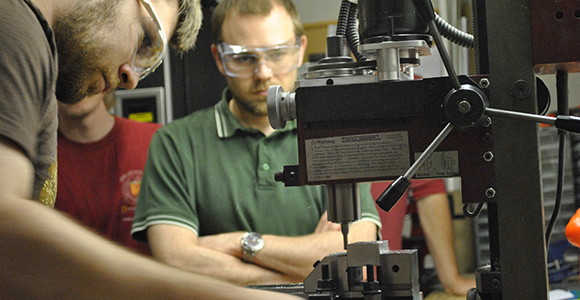
(Photo Credit: HeatSync Labs/Flickr)
A group of business, labor and civic leaders connected with the California Economic Summit have urged the Legislature's Budget Conference Committee to approve $200 million in funding for a promising program to boost career technical education (CTE) in the state's community colleges.
In a letter sent out this week, the Summit leaders called the new Strong Workforce Program “a vital next step toward producing more and better Career Technical Education programs that align with emerging and evolving middle-skilled jobs.”
One of the big issues the program works to resolve is how the money is distributed.
As a participating member of the Community Colleges' Strong Workforce Task Force, the Summit supported the Task Force’s recommendation that all of these new funds should be allocated to regional collaboratives—viewing this is as the best way to encourage colleges to coordinate their activities, serve students attending more than one college, and meet labor market needs in the most fiscally sustainable way.
But that has run up against opposition during the legislative process. While expressing concern about an amendment that requires 60 percent of the money go directly to the colleges, the Summit leaders argue that “given the options before the Committee, we urge you to support the proposal by the Governor and Senate to ensure that no less than 40 percent of these funds are allocated regionally.”
Since its inception, the California Economic Summit has pushed the issue of investing in better workforce preparation. In 2016, the Summit heightened the emphasis, calling for the production of one million more middle-skill workers in the state over the next 10 years.
With wages stagnating and income inequality rising—and millions of Californians struggling to make ends meet in low-wage jobs—industries from health care to manufacturing are still struggling to find skilled workers. The Summit has set a goal of closing this looming “skills gap” by supporting the formation of regional civic organizations that can align the state’s expansive training and education programs with the needs of employers.
Prime among them is the $200-million investment the Legislature is expected to pass in June.
The letter (which you can read here) is signed by 17 Californians including Alma Salazar, co-lead of the Summit's Workforce Action Team and vice president of education and workforce development at the Los Angeles Area Chamber of Commerce; Matt Bogoshian, co-lead of the Advancing Manufacturing Action Team and chief strategy officer and general counsel at REV; and Chris Harrington, co-lead of the Advancing Manufacturing Action Team and former vice president of strategy at Toshiba.
The Summit leaders also urged the committee members to support amendments in the May 13 draft of the trailer bill language requiring the Academic Senate to create a CTE subcommittee (composed of no less than 80 percent CTE faculty). This provision will empower CTE faculty to work closely with employers to make sure that programs, curricula and instruction are aligned with the needs of the workplace, and that students build skills that employers want.
Recent reporting has showed some real-life examples of what California’s employers need workers now. Southern California Edison senior vice president Pete Dietrich told CAeconomy that the “union benches are empty” and he has been searching nationally to find qualified workers.
There are also thousands of HVAC (heating, ventilation and air conditions jobs) available in California and not enough workers skilled enough to fill them.
And just two weeks ago, nearly 400 people—many of them community college students—attended a Global Trade and Logistics Summit in Long Beach to find out about the thousands of jobs available in that sector as well.
“We need a stronger, more robust workforce for our region,” said Kish Rajan, president of the Southern California Leadership Council said recently. “The Community Colleges play a key role in that work.”

